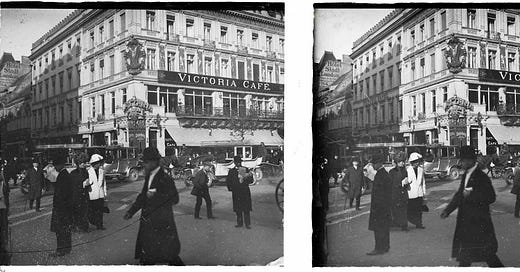This is the story of a store that survived the global economic crisis of the late 1920s, National Socialism, World War II, East German socialism, and competition caused by globalization and digitalization. It’s a story of human destinies, setbacks, and tenacity. A tale of abundance and enchantment. Ultimately, it’s about dealing with adversity and suited to put our current concerns into perspective.
Josef Leichtmann and the magic sisters
In 1884, Josef Leichtmann (1855 - 1929), a Jewish artist and merchant from Vienna, founded the shop Der Zauberkönig (The King of Magic) in Berlin with his wife Leonia.1 He opened three more in Hamburg, Cologne, and Munich. All offered magic goods. Over time, each of his four daughters took over one of the shops, which is why they were called "the magical sisters.“ In 1906, Leichtmann transferred the Berlin shop to his eldest daughter, Charlotte, and her husband, Arthur Kroner. In the 1920s, the store developed into an address for artists from all over the world.
The Nuremberg Laws passed by the National Socialists in 1938 prohibited Charlotte and Arthur Kroner from continuing to run their shop. They were expropriated in 1942 and committed suicide in early 1943 to avoid deportation: on January 31, 1943, Charlotte swallowed poison, Arthur followed her on April 2, 1943. Their daughter Meta, who had been working in the shop for a long time and was supposed to take it over, was arrested at Alexanderplatz and deported to Auschwitz, where the Nazis murdered her on February 26, 1943.
Charlotte and Arthur had two more daughters, Erna and Hilde. Both managed to emigrate to New York, where their descendants still live. Hilde became a successful magician known as "Hildeen - the trickiest hands in magic" and campaigned for the memory of her parents.
Regina Schmidt and the double rescue
In 1920, at 14, Regina Schmidt began her apprenticeship with the Kroner family at the Zauberkönig, where she enjoyed the complete trust of the owner’s family. When the Nazis evicted the Jewish owner’s family, she took over the business in 1938. Whether she took advantage of the situation or tried to save the shop for the Kroners cannot be reconstructed with certainty. The only sure thing is that she managed to save the shop.
The store was located at Friedrichstrasse 54 (today: 55). After the war, this part of Berlin belonged to the socialist East. When owner-operated shops in the GDR were nationalized in 1952, Regina fled under cover of the night with as many products as possible in the trunk of her car to West Berlin, where she continued to run the Zauberkönig until 1978. Hermannstrasse 84 in the Berlin district Neukölln became the store's new address.
Günter Klepke, Mona Schmidt, and the challenges of capitalism
From 1978 to 1995, the trained sound designer and magician Günter Klepke ran the Zauberkönig together with his wife, the seamstress Helene Klepke, until the two of them placed it in the hands of their daughter Mona Schmidt, who had already been working in the shop since 1978. When discounters with cheap, low-quality goods from the Far East and the emerging online trade began to make business hard for the tiny shop, Mona gave up and decided to close the Zauberkönig in 2012.
In a surprising turn of events, Mona's niece, Karen German, and her best friend, Kirsi Hinze, decided to save the store. The long tradition and the knowledge that they would carry a place with special meaning for many people into the future motivated them to take this step into the unknown.
New challenges quickly emerged. In 2018, the Zauberkönig’s lease was terminated, and the building where the store had been located for 65 years was demolished. Despite ever-increasing rents, the young owners found a new location on Herrfurthstrasse, where they celebrated the shop’s 140th birthday on July 13th, 2024.
Today, the Zauberkönig offers over 2500 bizarre objects: magic and joke items, nostalgic toys, and costume supplies. Meanwhile, a fear-driven bureaucracy bans products like stink bombs in glass ampoules and sugar cubes hiding a plastic spider. Nonetheless, the store continues to offer an astonishing number of superfluous items that make children's eyes light up and adults laugh.
People responding to life's circumstances
The story of the Zauberkönig does not invite romantic idealization. It reflects almost one and a half decades of history, including the National Socialist tyranny and the socialist dictatorship. It can be told as a story of people under the constraints of different systems. It tells us how they dealt with difficult circumstances and tried to counter adversity. It reminds us of times that offered far fewer options than today. It shows what is at stake and worth fighting for.
Unless other sources are linked, my description follows the shop’s history as researched by the current owners and documented on their website.





This is such a beautiful story! Thanks Dirk for digging this up. Großartig. ;)
Thanks so much, Holm!